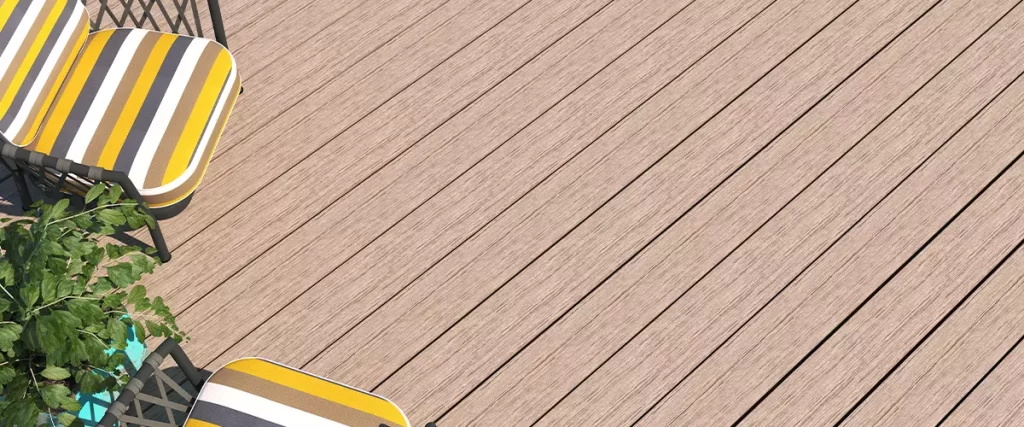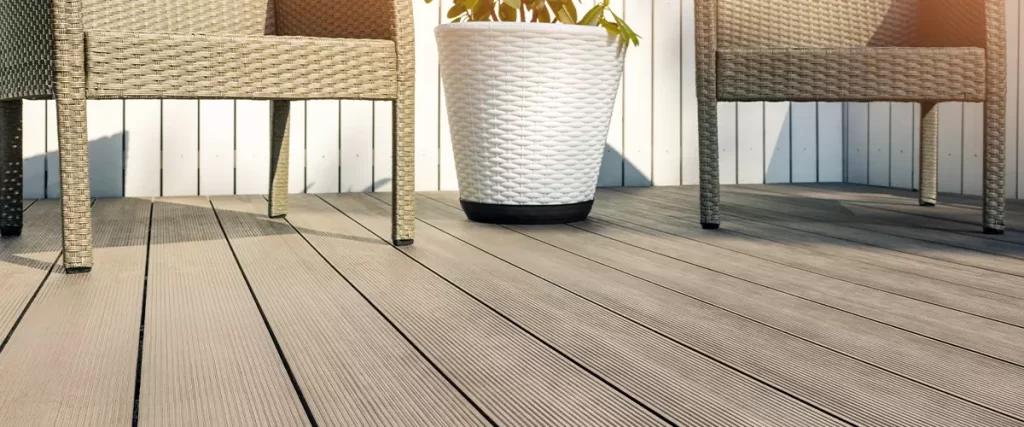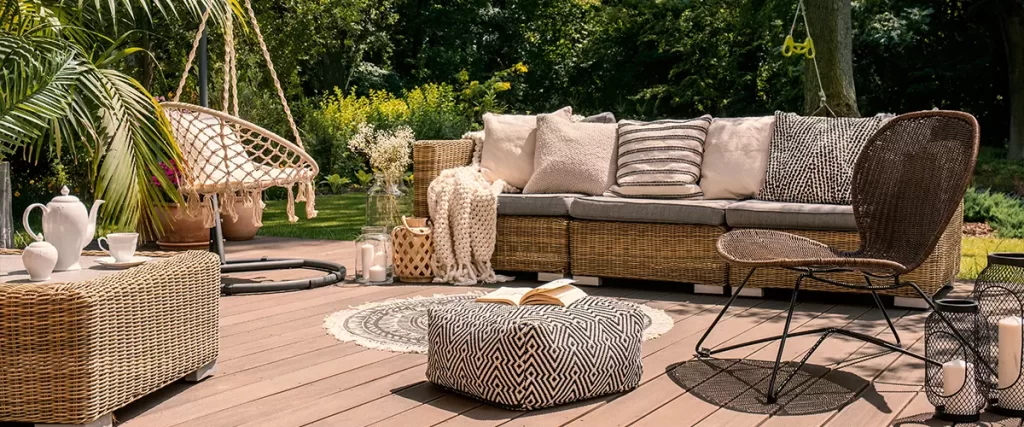Here in Denver, your deck will face high UV rays and a lot of dry weather in the summer but freezing temperatures and snow in the winter.
For these climates, composite decks are usually the best option for a lifelong investment, but there are times when wood decks might work just as well.
Let’s find out which is better for your particular situation.

Pros And Cons Of Wood Decks In Denver
| Pros Of Wood | Cons Of Wood |
|---|---|
| Aesthetic Appeal: Wood decking has a natural and warm aesthetic that many homeowners find attractive. They can enhance the overall look of a property and blend well with the surrounding environment. It’s tough to find composite boards that can mimic the wood fibers to perfection. | Maintenance Requirements: Wood decks require regular maintenance, including sealing, staining, and occasional repairs. This is particularly important in areas with extreme weather conditions like Denver, where exposure to sunlight and snow can impact the wood. |
| Versatility: Wood is a versatile material that can be customized to match different styles and preferences. It can be stained or painted in various colors to suit individual tastes. | Vulnerability to Weather: Wood is susceptible to weather-related issues such as warping, splitting, and rotting. These issues may be more pronounced in Denver, where there are temperature variations and occasional heavy snowfall. |
| Local Availability: Wood is generally readily available in the Denver area, making it a convenient and cost-effective option for decking materials. | Pest Vulnerability: Wood decking is prone to insect infestations, including termites and wood-boring beetles. In some regions, this can be a significant concern and may require additional preventive measures. |
| Initial Cost: Wood decks can be more affordable initially compared to some alternative materials like composite or PVC. | Long-Term Cost: While wood decks may have a lower initial cost, the long-term cost of maintenance and potential repairs can add up. Other materials, such as composite decking, may require less maintenance over time. |
| Repairability: In case of damage, any natural wood deck is relatively easy to repair. Boards can be replaced individually without needing to replace the entire deck. | Fire Risk: In areas prone to wildfires, the fire risk of a wooden deck can be a concern. Some homeowners may prefer fire-resistant decking materials for added safety. |
Pros And Cons Of Composite Decks In Denver
| Pros Of Composite Decks | Cons Of Composite Decks |
|---|---|
| Low Maintenance: Composite is a decking material that requires minimal maintenance compared to wood. It doesn't need staining, sealing, or painting, reducing the time and effort needed to keep it looking good. | Initial Cost: Composite decking materials can be more expensive upfront compared to traditional wood. However, the lower long-term maintenance costs may balance out the initial investment. |
| Durability: Composite decks are resistant to rot, warping, splintering, and insect damage. This makes them well-suited for areas with diverse weather conditions, including Denver's fluctuating temperatures. | Heat Retention: In sunny climates, the composite decking material can retain heat, making it uncomfortable to walk on with bare feet. This can be a consideration in Denver during hot summer days. |
| Longevity: Composite decking tends to have a longer lifespan than wood, often lasting 25 years or more. It can withstand exposure to the elements without deteriorating as quickly as some natural wood materials. | Scratching and Staining: While composite decking is durable, it can still be scratched or stained under certain conditions. Care should be taken to avoid dragging heavy furniture or using abrasive cleaners. |
| Color Options and Consistency: Composite decking comes in a variety of colors and styles, and it maintains a consistent appearance over time. It doesn't fade or change color as much as some types of wood. | Limited Repairability: While composite decking is durable, repairing specific sections can be challenging. In some cases, the entire board may need to be replaced if damage occurs. |
| Environmental Considerations: Some composite decking materials are made from recycled materials, making them a more environmentally friendly option compared to traditional wood. | Appearance: While many people appreciate the appearance of composite decking, some may prefer the natural look and feel of wood. The aesthetics of composite materials might not match everyone's taste. |
| Resistance to Fading: Many composite decking products are designed to resist fading caused by UV rays, ensuring that the color remains vibrant over the years. | Environmental Impact: Although some composite materials use recycled content, the production process can still have environmental implications. Additionally, composite materials may not be as biodegradable as wood. |

So, Which Type Of Deck Is Better For Your Situation?
Deck Sealing
Whether it’s a pressure-treated wood deck, a cedar deck, or a hardwood deck (mahogany, teak, oak, etc.) the sun’s ultraviolet rays will accelerate the natural aging process of wood. This causes it to fade, warp, and crack over time.
By applying a quality sealant, homeowners create a shield that blocks UV rays, preventing the wood from succumbing to sun damage. Additionally, in regions with varying humidity levels, such as Denver, where weather conditions can range from dry to humid, sealing provides a waterproof barrier.
This protective layer minimizes the risk of rot, mold, and decay.
Deck Staining
Similarly to sealing, deck stains act as a shield, absorbing and reflecting a significant portion of the sun’s ultraviolet rays, and giving the wood deck a protective barrier against humidity.
Staining your deck will minimize the risk of swelling, warping, and rot caused by moisture and UV rays. Staining contributes to the long-term durability of a wood deck, making it a wise investment in regions like Denver.

Frequently Asked Questions
Conclusion
When choosing between wood and composite decking in Denver’s dry climate, it’s important to consider factors like longevity, maintenance, budget, and personal preferences.
- Wood has a classic look but requires more upkeep. Sealing and staining are mandatory if you want your deck to last. Besides, you’ll always want to keep an eye out for rot and decay signs.
- Composite decking is a low-maintenance option that won’t require much of your attention. You can leave this deck in rain or sun for years and you won’t see any difference. However, it has a higher upfront cost.
If you’re not completely sure which is best for your property, give us a call at (303) 475-5769 and we’ll help you out. Here at Decks For Denver, we take pride in installing some of the best decks for our customers in Denver, and we can help you too!
